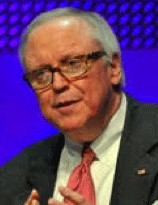|
The rapidly growing trade in e-commerce shipments
into the U.S. could be severely disrupted by the Trump administration’s
order earlier this month instructing the U.S. Postal Service (USPS) to
withdraw from a treaty setting shipping rates with nearly 200 countries.
In Part Two of his analysis, FlyingTypers SkyKing looks at who might be
the winners and losers as the repercussions of the decision unfold.
All That
Glitters
As noted in Part 1, the Trump Administration
has a number of strategies it can pursue following its decision to pull
USPS out of the Universal Postal Union (UPU) treaty. But whichever path
negotiations and preparations take, the ensuing disruption will have a
strong bearing on air freight volumes and rates in the short-term, and
the packages and e-commerce market in the long-term.
 Suffering
Catfish Suffering
Catfish
According to Charles ‘Chuck’
Clowdis, Jr., Managing Director of Trans-Logistics Group, Inc., a transportation
consulting and litigation support specialist, if the United States is
unable to reach an agreement to restructure international postal rates,
particularly the “terminal rates” provisions under the UPU,
volumes of shipments up to 2 kg destined for the U. S. from China and
other major e-commerce origins currently flown could potentially suffer.
“Parity to domestic rates when considering
distance is being sought by U.S. negotiators through the Universal Postal
Union and while signals of intent to possibly withdraw have been raised,
numerous rounds of discussions and negotiations will occur before any
withdrawal occurs,” he told FlyingTypers.
Will Nervous Make A Difference?
“Nonetheless, nervous shippers and
receivers are bracing for any impact, and air cargo service providers
rightfully are keeping a close eye on the talks.
“My personal view from these early
stages is that a mutually beneficial resolution will be found - ecommerce
growth is vital to the global economy, adding pressure to find an equitable
resolution.”
The Fair
Game
The world’s leading integrators and
e-tailers will certainly be keeping a close eye on the negotiations. Companies
such as Amazon and FedEx have long taken issue with the treaty, claiming
that it offered unfairly discounted shipping rates to foreign shippers.
However, according to Nomura, the Trump
administration is also seeking higher postal rates (by 9-12%) on services
USPS renders to the likes of Amazon, UPS and other major shippers.
 My
Analyst Told Me My
Analyst Told Me
“The biggest thing is higher prices
for shipments from China to the U.S.,” said Cathy Roberson, founder
and head analyst at U.S.-based consulting firm Logistics Trends &
Insights.
“This will hurt e-commerce providers
such as Amazon and eBay, eBay especially because they have a partnership
agreement with the USPS for its ePacket solution.
“However, it could benefit the express
providers - UPS, FedEx and DHL - because it would force shippers to pay
the ‘Big Three’ prices for shipping instead. UPS has been
a proponent of the U.S. leaving the UPU or renegotiating for a more level
playing field for some time now.
“I don't think we'll see less air
cargo because of this. I believe cross-border e-commerce is here to stay
regardless, particularly as more B2B transactions are conducted online.”
Spreading Impact of UPU Exit
Roberson also noted that withdrawing from
the UPU would not only affect China, but also other countries deemed ‘developing’
or ‘emerging’.
“They all receive lower shipping pricing,
but if the U.S. does leave, they will lose that privilege to and from
the U.S. as well,” she said. “Keep in mind though, it is a
one-year process for the U.S. to leave the UPU and there will be negotiations
- perhaps a reclassification of China? Who knows.”
Higher Postal
Costs In The Wings?
Nomura, meanwhile, said that the broader
implication of Trump’s move succeeding in its demand for a fairer
terminal dues compensation system for USPS would be higher postal costs
for postal operators across the board, particularly, those in the lower-tiered
classification country rankings.
“This consequently would translate
to pricier e-commerce goods,” the analyst noted. “For example,
those shipped from China, when factoring in the higher revised shipping
costs, which could have a negative chain reaction on the last-mile players
in ASEAN if it results in lower demand.”
However, the likely key beneficiary to this
potential change in terminal dues structure by the UPU in the event Trump
succeeds in negotiating a fairer deal with UPU, are postal operators in
the higher-tiered countries “as their undercharged amount naturalizes
to zero”.
Nomura added: “Within our ASEAN logistics
coverage, we see Singapore Post as the primary beneficiary - Singapore
ranks one tier below U.S. - in way of receiving higher compensation for
terminal dues collected from the lower-tiered postal operators. On the
flipside, however, with e-commerce shipments being at risk of seeing demand
waning due to higher shipping cost across the board, this could consequently
result in slower transshipment volume growth handled by SPOST.
“At this juncture, the development
is pretty fluid and, considering the amount undercharged by the U.S.,
the Trump administration may prefer to negotiate postal rates on a bilateral
basis while, for other postal operators, it would likely remain a status
quo.”
 The
Disruption Factor The
Disruption Factor
As the negotiations proceed, Nicola Hughes,
Air Cargo Business Development at Freight Investor Services (FIS), said
air freight markets would be disrupted as shippers evaluated the potential
outcomes.
“As the U.S. begins the process of
the leaving the Universal Postal Union in a bid to stop subsidized international
parcel delivery rates, we expect to see a rush of shipments for small
parcels going from China to the West ahead of the rates rise,” she
told FlyingTypers.
“Depending on capacity availability,
this could have an impact on air cargo rates in the short term, and long
term we may see e-commerce providers looking for other solutions to avoid
the increased delivery rates.”
SkyKing
For Part 1 click here. |




 Vol.
17 No. 71
Vol.
17 No. 71 Vol.
17 No. 72
Vol.
17 No. 72